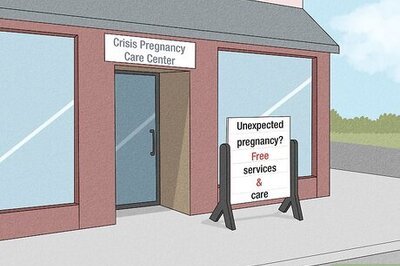
views
WASHINGTON: The United States on Thursday expanded its campaign to deliver COVID-19 vaccine shots into the arms of doctors and nurses on the frontlines of a pandemic that has killed more than 2,500 Americans a day, even as a major winter storm threatened to slow progress on the East Coast.
While medical professionals at a growing number of hospitals rolled up their sleeves, lawmakers on Capitol Hill said they were nearing a long-elusive bipartisan deal on $900 billion in economic relief to help bolster a U.S. economy ravaged by the pandemic.
Rollout of the first tranche of 2.9 million doses of a newly authorized vaccine from Pfizer Inc and German partner BioNTech SE continued for a third full day, with shipments headed to 66 more distribution hubs nationwide.
A second vaccine from Moderna Inc could win emergency-use approval from the U.S. Food and Drug Administration this week.
Express delivery companies FedEx and United Parcel Service, sharing a leading role in vaccine shipments, said they were monitoring the potential impacts of heavy snow and ice that had begun to disrupt transportation systems along the Eastern Seaboard on Wednesday.
U.S. Army General Gustave Perna, overseeing the government’s Operation Warp Speed vaccine campaign, said FedEx and UPS have developed strategies for bad weather, including plans to keep any delayed vaccine shipments secure until they can be “delivered the next day.”
“We are on track with all the deliveries we said we were doing,” Perna told reporters at a briefing.
Some 570 other vaccine distribution centers received the bulk of the initial batch of shipments on Monday and Tuesday, and an even larger wave was due for delivery to 886 additional locations on Friday, Perna said.
From each distribution site, vaccine doses were divvied up among area hospitals and administered to healthcare workers, designated as first in line to be immunized. Some were also going to residents and staff of long-term care facilities. Later vaccine rounds will go to other essential workers, senior citizens and people with chronic health conditions.
U.S. President-elect Joe Biden, who has said he would get the vaccine publicly to help instill confidence in its safety, is expected to receive his first injection as soon as next week, according to his transition team.
Biden, 78, is in a high-risk category for the coronavirus due to his age.
‘NOT OVER YET’
It will take several months before vaccines are widely available to the public on demand, and opinion polls have found many Americans hesitant about getting inoculated.
Political leaders and medical authorities in the meantime have launched a media blitz assuring Americans that the vaccines are safe while urging them to avoid growing weary of social distancing and mask-wearing while the pandemic rages on.
“It is not over yet,” Dr. Anthony Fauci, a member of the White House coronavirus task force, told CBS News on Wednesday. “Public health measures are the bridge to get to the vaccine, which is going to get us out of this.”
Data shows surging COVID-19 infections and hospitalizations are driving healthcare systems to the breaking point across much of the country, with many intensive care units at or near capacity.
The United States reported 3,102 coronavirus deaths on Tuesday, the third-highest daily toll since the pandemic began and the third time in a week that number has surpassed 3,000. The seven-day average topped 2,500 lives lost every 24 hours for the first time this week.
To date, COVID-19 deaths have climbed to 304,187 nationally, according to a Reuters tally, while the case load of 16.7 million known infections represented roughly 5% of the U.S. population.
With hospitalizations setting a record for the 18th day in a row – more than 112,000 patients under treatment on Tuesday – health experts warn the death toll will rise higher still in the weeks ahead, even as the vaccine campaign steadily expands.
Another 2 million doses of the Pfizer vaccine and 5.9 million doses of the Moderna vaccine could be allocated next week, U.S. Health Secretary Alex Azar said on a conference call on Wednesday. Two doses of the vaccines, given three or four weeks apart, would be required for each person being inoculated.
In all, the United States had options to buy up to 300 million doses of those vaccines, Azar said, plus hundreds of millions more doses of vaccines that have yet to receive approval, including some single-dose drugs.
The U.S. could have a surplus supply of vaccines in the future, if all the vaccines it has secured are authorized for use, Azar said, which could eventually benefit other countries.
The Trump administration was also in talks to secure additional antibody treatment doses from Regeneron Pharmaceuticals Inc and Eli Lilly and Co, Operation Warp Speed chief adviser Moncef Slaoui told the same conference call.
Disclaimer: This post has been auto-published from an agency feed without any modifications to the text and has not been reviewed by an editor
Read all the Latest News, Breaking News and Coronavirus News here













Comments
0 comment